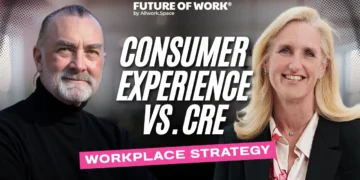- As the year comes to an end, it’s clear that the workplace has changed vastly and will continue to evolve into the new year.
- Ensuring a thriving and productive work culture starts with organization, goal setting, and great leaders.
- Shirley Knowles, Progress Chief Inclusion and Diversity Officer, shares five steps she follows to set effective goals for her team.
As the year comes to an end, it’s clear that the workplace has changed vastly and will continue to evolve into the new year.
But one thing remains the same: Ensuring a thriving and productive work culture starts with organization, goal setting, and great leaders.
Here are five steps for leaders to set goals for the new year:
- Determine your goals. Creating and setting leadership goals ensures the success of both leaders and their teams.
- Analyze your goals with the S.M.A.R.T system. For leadership goals to be effective, they need to meet the standards set by S.M.A.R.T. criteria, meaning they are specific, measurable, attainable, relevant and time-bound.
- Announce your goals to the team. Ensure that your goals align with the goals of your team/employees, otherwise they might not be so effective.
- Set performance indicators. Knowing why the goals are being pursued, what you hope to accomplish, and what resources will be involved isn’t enough. You also need to determine what success looks like by establishing performance indicators to help track your process.
- Create and build momentum toward goals and encourage teams to reach them. By doing this, it ensures that everyone thrives by meeting their goals and feeling a sense of accomplishment.
In a Q&A with Allwork.Space, Progress Chief Inclusion and Diversity Officer Shirley Knowles explained exactly how she sets effective goals for her team.
Allwork.Space: What goals are you setting for the new year for your team?
Shirley Knowles: At Progress, we are implementing a four-pillar push across the organization backed by essential diversity and inclusion initiatives to foster a greater human element.
Alignment throughout the organization can be difficult if leaders don’t understand their people’s strengths, weaknesses, and motivations. To ensure that prioritizing diversity of thought matters, we are implementing a diverse and inclusive talent pipeline that facilitates equity.
Not only does diversity help create a more collaborative environment – which, in turn, can help make a business more successful – but also it highlights a core need to build a culture where everyone belongs.
People need to ask themselves what that looks like and what it feels like. Organizations that self-reflect and set goals to ensure an open and honest culture have minimized turnover.
Demonstrating accountability to train and mentor employees to the best of their abilities is a critical goal for Progress next year. Leaders who understand that their actions impact their teams and colleagues will have a better chance of demonstrating a commitment to accountability.
When organizations realize that establishing diversity, equity, inclusion, and belonging initiatives ultimately drives greater brand representation, we’ll see more companies leveraging talent and diversity as a core element within the organization’s mission.
These goals for 2022 are not just on-the-shelf policies, but rather carefully selected initiatives to drive systemic, actionable change, and effectively pursue a more meaningful organization.
Allwork.Space: How will you begin to implement these goals?
In 2022, my team and I plan on continuing listening tours to gather feedback from several departments at Progress to help inform strategy.
These tours serve as key touchpoints with personnel where they can discuss what works best for them and their teams, which helps foster a greater sense of belonging and highlights a pivotal goal to build more compassionate leadership.
Allwork.Space: What has changed since last year, in terms of creating new goals for the next year?
At Progress, we are always looking for areas of growth and improvement — evolving with the disruption that ripples throughout the technology landscape.
Placing greater care on creating meaningful goals for 2022, we found the diversity pipeline, culture, and leadership accountability have changed over the last year, making these targets a priority moving forward.
The talent pipeline has always been diverse at Progress, however, this field is still predominantly male-dominated. To truly diversify the pipeline, all candidates, regardless of age, gender, race, or disability, are given an equal and fair chance.
Doing so will help foster a greater sense of belonging to the Progress culture and dispel the myth that belonging is solely based on tenure. By questioning, if every employee truly feels they belong, leaders will ultimately become more accountable to their desire to lead with empathy.
While there’s always room for improvement, by assessing how these changes impact employees’ performance — companies can create realistic goals that contribute to the overall success of the organization.
Allwork.Space: How can other leaders set goals for their companies/employees?
Goal-setting is a seemingly important touchpoint for many leaders who look to this process yearly or quarterly to determine if the goals set are appropriate. For many companies, it can be easy to lose sight of critical internal goals and only focus on performance-based metrics.
This critical part of a manager’s job has never been more essential than in years past, with leaders looking to collect feedback in real-time from employees. The key to hands-on leading with empathy is building a foundation of trust rooted in assessing everyone’s level of capabilities and committing a degree of accountability across the organization.
By doing so, leaders remove self-serving or unconscious bias and set goals for their company that support each person’s individual growth and help them reach their full potential.
Allwork.Space: What goals are the most important in order to foster a successful work culture?
As a leader, do you know what makes a successful work culture? Many will say yes, but the truth is it’s an ever-evolving environment that needs care. Work culture in the past has been highly self-serving, with everyone looking to get something different out of their experience.
Today’s view on successful work culture is starting to change with the goal of fostering an environment where everyone belongs is key. The first step to laying the groundwork is implementing authentic leaders who utilize empathy in their approach.
By establishing transparency across the organization, employees can trust the benchmarks set by their leaders and hold themselves accountable and their peers.


















